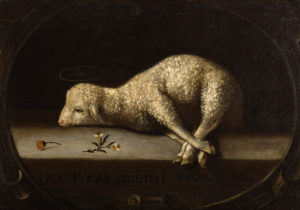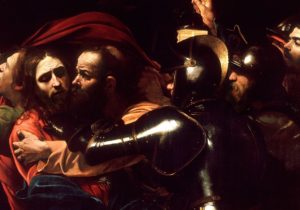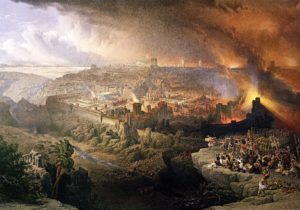“What Four Men Found in Bethlehem,” by Walter Russell Bowie
December 23, 1946
Is it a page out of far-off history not written down before? Or is it a legend? Or is it only a dream?
Who can tell? Yet, nevertheless, here is the story.
On the night when the little child of Mary was born in the stable in Bethlehem, there were many other persons in the town, and among them three particular ones of whom we shall hear at this new Christmastime. They were in the inn when Mary and Joseph could not gain admittance. They slept within the sheltering walls while the Christ-child was born in the stable. They knew nothing of the brightness of angels in the sky. They heard nothing of shepherds, who on the plains of Bethlehem, heard an angel’s voice, and hurried to the stable to see the little child in Mary’s arms. They only slept unknowing, and one by one the next morning they rose indifferently to start upon their homeward way.
But as they set out together on the road that led down from the hill of Bethlehem to the Judaean plain, it happened that they drew together; and they talked to one another and asked what had brought them there.
The first of them was a Roman centurion whose name was Marius, who rode upon his horse. And this is what he said:
“I came to Bethlehem with a detachment of legionaries to guard the town during the enrollment and the taxing, and I came also for another particular reason of my own. I know the man who has bought the privilege of collecting Caesar’s taxes here in Bethlehem. I have done business with this Jacob Ben Israel before. I said to him that it was plainly to his good that Roman soldiers at my command should be here to watch against thieves, and to keep the town in order while he gathered in his revenue. He was a wise man, and he understood. And so I come away from Bethlehem”—and here he touched his girdle—“with these hundred silver denarii which I can use to good advantage. I shall enlarge and adorn the courtyard of the house I am building for myself in Caesarea. My visit to Bethlehem has worked out well.”
The second was a sheikh who dwelt in his wide tents on the plains of the Shephelah. His name was Ilbrahim; and as he rode on his camel, thus said he:
“There is a marketplace in Bethlehem where many sheep are sold on the days when crowds come into the town. There are those in Bethlehem who have charge of the marketplace, and there was need of a little private converse between them and me. So I came upon my camel hither to talk with them. Hereafter my sheep will be given room in the market before the flocks of any others who have sheep to sell. It is true I had to cross their palms with money; but the money I have paid will come back to me many times over in the days ahead.” He laughed, “This journey to Bethlehem will mean much profit, and I am satisfied.”
Then spoke the third, a rich man of Jerusalem whose name was Hazor, who rode upon a mule richly caparisoned.
“An old friend of mine in Bethlehem lives in the one great house of the town,” said he. “Once in every year he gives a feast to all his acquaintances, and I came to his feast last night. Such a banquet as it was! There were cakes made from the finest flour that is grown upon the Judaean plains, the flesh of lambs, fish from the Sea of Galilee, pomegranates and dates and other fruit from the gardens of Damascus, and wine from the vineyards of Lebanon. Such a feast Caesar himself might have envied. It was worth more than a journey from Jerusalem.”
Then as the three rode together, they became aware of a shepherd lad who had been walking in the field beside them, keeping pace with them as they made their slow way down the hill, and gazing at their faces.
They stopped and looked at him.
“What mean you by walking there and staring at us?” said Marius.
“Forgive me, my masters,” said the lad. “I have heard what you were saying, and I wondered.”
“Wondered at what?” said Ilbrahim.
“Wondered whether there was not more that you saw and found in Bethlehem,” said the shepherd. “Did you see last night a shining in the sky?”
“Not I,” said Marius. “I slept sound in the inn with a hundred good denarii to keep me company.”
“Nor I,” said Ilbrahim, “I too slept, and my dreams were opulent.”
“I saw nothing but the lights of the banquet hall where the wine flowed. Those were lights enough for me,” said Hazor.
“And did you hear no tidings of a Child that was born?” said the shepherd.
They looked at one another in amazement, and they laughed.
“Who cares for nonsense such as this?” said Marius. “Every moment somewhere a child is born. What concern is it of mine if there is another more or less in Bethlehem? I came to teach Jacob Ben Israel how to be generous. He learned his lesson well, and I am going away with all that I wanted to get in Bethlehem.”
“I have made my arrangements in the marketplace, and that will suffice for me,” said Ilbrahim .
“I have had my feast, and that will be enough to dream on for many days to come,” said Hazor.
Then as they went their way along the road the shepherd stood and looked after them. For a long time he gazed. And then his eyes lifted, and he looked at the sky and at the rim of the far-off hills. Slowly in his face a light began to glow, as though some inward flame were burning. Then softly he began to sing.
“At the end will be but rust,
Where earthly treasures are;
They whose eyes are in the dust
Will never see a star.
They who came to Bethlehem
And only dross have sought
Will take away alone with them
The emptiness they brought.”
He stopped, and was silent while still his eyes were wide. Then he began again to speak, as though in the quiet field there were something which would hear.
“They think that they carry power and wealth and honor with them where they go; but it is not true. For the world will not be made better by the craft and violence of Rome, nor by the greed of merchants, nor by the indulgence of the rich. Surely the truth rather is in what I heard last night in the vision of the angels, and in what I saw as I knelt there by the manger in the stable in Bethlehem. Love was there. I saw it shining in the mother’s face. It has come in some strange new way of wonder to our world in the Child who is called ‘the Saviour.’ The three men yonder who have found all they sought in Bethlehem will go on their way and be forgotten. But only those who shall learn in Bethlehem the meaning of love will be redeemed.”
Walter Russell Bowie (1882 – 1969) was born in Richmond, Virginia, and while studying at Harvard was co-editor of the The Harvard Crimson with Franklin D. Roosevelt. He became an Episcopal priest in 1909 and served in Virginia, where he was the editor of the Southern Churchman. In 1923 he became a priest for Grace Church in Manhattan, and he became an author and hymnist. During World War I he was a Red Cross chaplain in France. In 1939 he left Grace Church to teach at Union Theological Seminary, and in 1950 he moved back to Virginia to teach at Virginia Theological Seminary, where he is buried. He was a member of the editing team for Interpreter’s Bible series and the editorial committee for Revised Standard Version of the Bible. His more popular hymns include “O Holy City, seen of John,” “Lord Christ, When First thou Cam’st to men,” and “God of Nations, who from dawn of days.”






 Sponsor a student for Christianity & National Security 2024
Sponsor a student for Christianity & National Security 2024